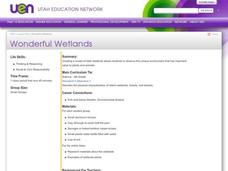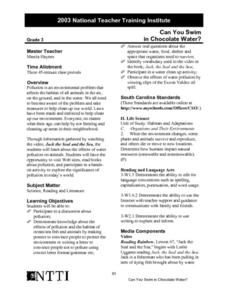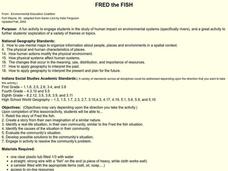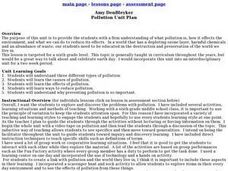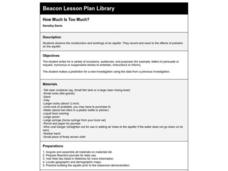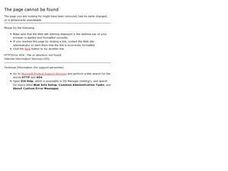Curated OER
Wonderful Wetlands
Fourth graders create a model of Utah wetlands using clay, sponges and soil. They identify the value the wetlands have to plants and animals. They simulate rainfall to observe how wetlands help filter silt and pollutants from the water.
Curated OER
How Our Water Becomes Polluted
Students list causes of water pollution, discuss how people contribute to water pollution, and explain concept of watershed.
Curated OER
EPA Pesticides Reduction
Students examine the effects of pesticides on the environment and bugs. They answer questions as an assessment.
Curated OER
Taking Charge of our Earth and its Resources
Students identify natural resources, discuss conservation and protection of them, and identify how pollution is harmful to the environment. Seven lessons on one page.
Curated OER
Can You Swim in Chocolate Water?
Third graders discss water pollution and its affects on animals. They watch a demonstration using a plastic fish in a fish bowl in which various types of water pollution are illustrated.
Curated OER
FRED the FISH
Students engage in the study of the human impact on environmental systems (specifically rivers). This instructional activity enhances Students' exploration of a variety of themes or topics.
Curated OER
Pollution Unit Plan
Sixth graders examine what pollution is and the ways in which it effects the environment. They investigate ways to reduce it effects in this unit of lessons.
Curated OER
Contaminated Drinking Water
Students see if they can tell if our water is safe to drink by looking at it and tasting it. They perform an experiment using salt and vinegar to see when they can tell water has been contaminated.
Curated OER
Pollution Solution
Students, after discussing oil pollution, generate solutions to an oil spill.
Curated OER
Birds, Baths And Oil Spills
Students examine effects of an oil spill on birds and animals that inhabit marine or freshwater ecosystems, and simulate procedures used by rescue workers who rescue and rehabilitate birds and other animals coated with oil.
Curated OER
Problems in Pollutia
Fifth graders, in groups, pretend as if they live in the imaginary kingdom called Pollutia. They make recommendations about environmental issues and give short speechs on how each problem should be solved.
Curated OER
The Water Detectives
Students collect water samples from designated sampling stations, and discuss water pollution. They analyze the water samples, record the data on a spreadsheet, and present the environmental water quality data to the class.
Curated OER
HOW MUCH IS TOO MUCH?
Students observe the construction and workings of an aquifer. They record and react to the effects of pollution on the aquifer.
Curated OER
Adopt a Gutter
Students explain the effects of polluting the storm drain system. They provide a service to the community by locating and maintaining a section of street gutter. They produce signs and flyers that describe their work.
Curated OER
Water Pollution - Group Presentation
Students investigate water pollution at a web site and apply it toward a group presentation.
Curated OER
ECOSYSTEMS : ANIMAL SURVIVAL
Students explore how Earth's natural processes and people's activities affect the ecosystems and animal world. Find out how well different species adapt to new conditions and fight for survival.
Curated OER
Comparing Microscopic Organisms in Fresh and Polluted Water: An Invitation To Inquiry
Students have the opportunity to develop and formulate ideas and explanations through the scientific standard of inquiry. They identify organisms by using an identification key for specific aquatic geographical area.
Curated OER
Clean Water vs. Dirty Water
Students study the importance of clean water to the survival of organisms and what activiities and material pollute water. They measure the temperature of water samples and create a class graph.
Curated OER
"Hard" Data from Space
Students use satellite images to analyze development patterns within Baltimore City. They prepare a land cover map for Baltimore indicating the prevalence of impervious surfaces and explore how these patterns affect water pollution.
Curated OER
CONTAMINANT SCAVENGER HUNT
Students identify substances and activities within a household that contribute to water pollution and identify safe cleaning alternatives for commercial cleaning products.
Curated OER
The Path of Pollution
Pupils name and locate countries where radiation from the Chernobyl accident traveled, describe how air pollution travels from one area to another and list the travel of radiation in chronological order.
Curated OER
Is Our Water Clean?
Students identify qualities of clean water which will develop an awareness of people in the community who keep our water clean. This lesson has a literature tie-in with the "Magic School Bus" series.
Curated OER
Are You Thirsty: The Effects of Pollution on Drinking Water
Students discuss the different causes of water pollution. In this ecology lesson, students brainstorm ways to purify polluted water. They formulate their conclusion based on the results of the experiments.
Curated OER
Heat Transfer and Pollution
Learners perform computer simulations on air dispersion. In this chemistry lesson, students calculate energy transfer based on specific heat and temperature change. They explain the causes of smog.


